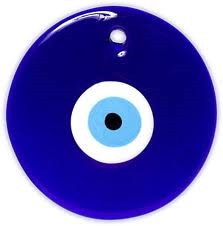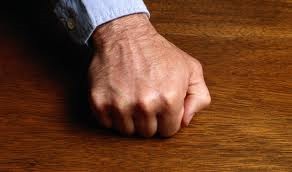by Nancy J. Cohen
In Jewish tradition, whenever you are thinking about how well things are going, you must give yourself a “Kinehora” (pronounced kin-ah-hoh-rah). If you don’t, you tempt fate to provide the opposite.
In my Yiddish dictionary, it’s spelled out as “Kain ein horeh” and means No Evil Eye, or may no evil befall you. In a recent example, I was thinking about how it had been years since I’ve had a cold. Then—boom, I catch my husband’s viral illness and get a terrible sore throat and sinus infection. I forgot to give myself a Kinehora.
My mother and aunt used to say it this way, which our kids think is hilarious: “Kinehora, kinehora, kinehora, poo poo poo.” Don’t ask me where this particular tradition originated or how much of it is valid. I just know, if you think things are going well and forget to say “Kinehora” or “knock wood” or whatever other phrase you choose, surely you’ll be hit with bad fortune.
Is this superstition? Of course it is. But it also respects the yin-yang of the universe. Keep in mind that you can say kinehora for another person. Let’s say your friend brags about his rise to bestsellerdom. You say “kinehora” in response so he isn’t cursed with evil.
Then I looked up the Evil Eye online. Belief in this phenomenon crosses many cultures. The evil eye is a malicious glance given to a person to whom one wishes harm. Often the person initiating the curse does so unintentionally and out of envy. Charms, amulets, and talismans can protect against this curse, like the blue glass decorated eye you see in gift shops. Supposedly this symbol reflect the evil back to the conjurer.
Giving yourself a kinehora is akin to knocking on wood. Whenever you boast about something or make a favorable observation, you can avoid tempting fate by performing this action or mentioning it. Or if you encounter something that might cause bad luck, like crossing paths with a black cat, you can counteract it by touching wood. Where did this practice originate? Early believers felt spirits dwelled in trees. By knocking on wood, you could alert them to help you. A Jewish version dates back to the Inquisition, when Jews gave a coded knock on wooden temple doors in order to enter safely. Again, this practice crosses many cultures just like the Evil Eye.
How does this apply to your writing career? You may think you’re on top of the world, doing great with your book sales, respected by your comrades, putting out multiple books to critical acclaim. And then boom—your editor leaves. Your line is cancelled. You’re asked to take a cut in your advance. Suddenly, you’re struggling to maintain momentum. The lesson here? Be kind to others, never think you’re above anyone, keep up with changes in the publishing world, and be open to new means of delivery for your work. And remember to say Kinehora or knock on wood whenever you think things are going well.
For more information, see these resources:
http://en.wikipedia.org/wiki/Evil_eye
http://en.wikipedia.org/wiki/Knocking_on_wood
http://ask.yahoo.com/20040504.html
http://wordsmith.org/board/ubbthreads.php?ubb=showflat&Number=123624
Now here’s another way for writers to apply this lesson to your characters. Are they superstitious? What phrase do they say under these circumstances? How about you?



Good advice, Nancy. Don’t get a big head when you’ve experienced a high point; and don’t let your heart stay broken when you’ve been set back. I don’t knock on wood, but I am reminded of the song, “Knock On Wood” from the film Casablanca. That was actually the song they thought would become a big hit, not “As Time Goes By.” Just shows you never can tell, which is another reason not to get too bent by events.
There’s a lesson here, and it’s a lesson so many child stars could have learned earlier. Being on top of the world today doesn’t mean you’ll be anywhere tomorrow.
That’s one of my favorite expressions, Nancy! And yes, my character Kate Gallagher is extremely superstitious in an Irish way. Whenever something good or lucky happens to her unexpectedly, she immediately expects bad news to follow, almost as if good luck invokes bad.
Yes, James and Sechin, you’re right. You never know which way the universe will turn so we should be grateful for what we have. Those who rise up the ladder only have farther to fall.
Kathryn, does your character have an Irish phrase or action that she expresses? And how do leprechauns fit in with her beliefs?
Well, thanks for that one. I’m suitably scared now. OMG, you’re absolutely write. I had that old “whistle-a-happy-tune” feeling just prior to nearly sawing of my thumb with a power saw.
Yunno. Thankfully it was just a thumb, and I’ve got an extra one, and I can still hit the spacebar. So which finger could you go without?
Ouch, Jim. Doing without a thumb is pretty tough. I went that route once with surgery for tendinitis on my right hand. Now it’s fine. I hope yours is, too. But next time you feel like whistling, knock on wood first.
One of my characters, Kharzai Ghiassi, has a habit of speaking in cartoon character voices when things get hard, dangerous, or weird. A Scooby Doo “Ruh-Roh!” or an Elmer Fudd “Ooh dat waskawy tehwowist!” generally helps Kharzai get focused and reminds him that just because death and destruction (or head colds, sore throats and roofers) are erupting all around doesn’t mean you can’t laugh a little.
Cuz after all, when the fight is over you’ll probably be alive. And if you’re alive that means you won, or escaped which is just a different kind of winning. And that means there’s probably all kinds of fun things and laughs and giggles in the future.
So, a positive attitude combined with confident violence of action and life will be grand. And if not, cartoon voices always bring the smiles out.
Thanks for that, Basil. I try an Elmer Fudd or Bugs Bunny voice next time I get jacked in an alleyway.
Using cartoon voices is an unusual character quirk. It is easier to face adversity with humor, no doubt about it.
Interesting about the blue eye. When my parents visited Turkey, my blue-eyed mother bought a glass brown eye pendant to wear around her neck because they thought blue eyes were ‘evil’ (or at least that’s what I remember her telling me). And anyone in the writing world knows you can’t take anything for granted. Enjoy what you have while it’s there. Or, as my kitchen cross-stitch says, “Life is uncertain. Eat dessert first.”
Terry
Terry’s Place
So what was the purpose of the brown glass eye pendant, to keep your mother’s “evil blue” eyes from casting spells on others?
I think it was because blue eyes are virtually unknown there, so she bought the brown eye so she would be considered a brown-eyed person. Maybe I’ll have to check with her and ask. For all I know, it could have been a scam to sell brown eye pendants. 🙂
I knew a guy with a pink eye and a blue eye. Bet that would set ’em all running for their lives.
I would think so, Jim!
We had several bad years around our house not so long ago, so each day that I get up and my car starts, my computer is working, and all the dogs and cats are walking around with their limbs intact, I have a “thank you, Jesus” moment. (That’s for those of us from a non-Jewish tradition. 🙂 )
I’ve come to learn that perspective is a powerful gift! Gratitude is also quite powerful. Even on a bad day, I realize things could definitely be worse.
Your mention of the evil eye reminds me of Grandma Bella in Janet Evanovich’s Stephanie Plum novels!
Yes, Diane, it helps to be grateful for what we have, but then give yourself a kinehora or knock on wood after you say your prayer of thanks.